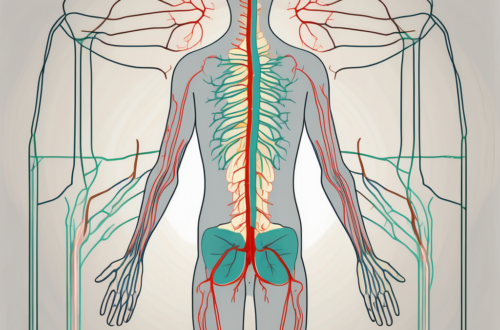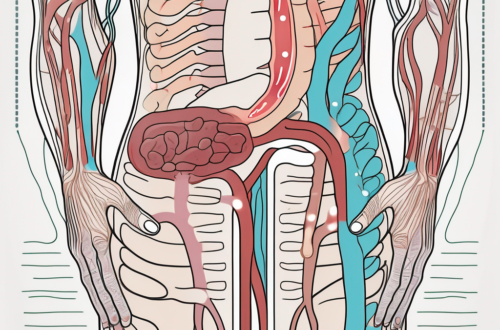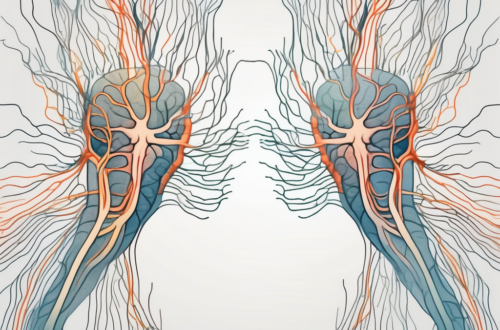Weight gain is a complex issue that can be influenced by various factors, including lifestyle, genetics, and hormonal balance. One essential component of the body’s regulatory system that plays a role in weight gain is the parasympathetic nervous system. Understanding the functions and effects of this crucial system can provide valuable insights into weight management and overall well-being.
Understanding the Parasympathetic Nervous System
The parasympathetic nervous system is one of the two divisions of the autonomic nervous system, responsible for regulating the body’s involuntary functions. While the sympathetic nervous system mobilizes the body’s fight-or-flight response in stressful situations, the parasympathetic nervous system is involved in promoting rest, relaxation, and digestion.
But what exactly does the parasympathetic nervous system do? Let’s dive deeper into its role in the body.
The Role of the Parasympathetic Nervous System in the Body
The parasympathetic nervous system is primarily responsible for conserving energy and promoting bodily functions during periods of rest and digest. It helps maintain internal equilibrium, allowing our bodies to repair and regenerate. When activated, it decreases heart rate, increases blood flow to the gastrointestinal tract, and stimulates the release of digestive enzymes.
Imagine a serene scene in nature, where you find yourself sitting under a shady tree, feeling a gentle breeze on your skin. This peaceful environment triggers the parasympathetic nervous system, signaling your body to slow down and enter a state of relaxation. As your heart rate decreases, your body can focus on essential functions like digestion.
During this state, the parasympathetic nervous system ensures that blood flow is directed towards the gastrointestinal tract, allowing for efficient digestion. It also signals the release of digestive enzymes, which break down complex molecules into simpler ones that can be easily absorbed by the body.
Furthermore, the parasympathetic nervous system optimizes bowel movements, ensuring that waste is eliminated effectively. This intricate dance of bodily functions is orchestrated by the parasympathetic nervous system, ensuring that our bodies can efficiently extract nutrients from food and maintain proper gut health.
The Parasympathetic Nervous System and Digestion
Digestion is a vital process that allows our bodies to break down food, absorb nutrients, and eliminate waste. The parasympathetic nervous system plays a crucial role in this complex process. When properly activated, it promotes the production of digestive enzymes, enhances nutrient absorption, and optimizes bowel movements. This ensures that our bodies can efficiently extract nutrients from food and maintain proper gut health.
Imagine enjoying a delicious meal with friends and family. As you savor each bite, the parasympathetic nervous system kicks into action, ensuring that your body can effectively process the food. It stimulates the production of saliva, which contains enzymes that begin the process of breaking down carbohydrates. This initial step sets the stage for further digestion.
As the food travels down the esophagus and reaches the stomach, the parasympathetic nervous system continues to play its part. It signals the release of gastric juices, including hydrochloric acid and digestive enzymes, which further break down the food into smaller particles. These particles are then passed into the small intestine, where the parasympathetic nervous system enhances nutrient absorption.
The parasympathetic nervous system ensures that the small intestine is well-perfused with blood, allowing for efficient absorption of nutrients into the bloodstream. It also stimulates the release of bile from the gallbladder and pancreatic enzymes, which aid in the breakdown of fats and proteins, respectively. This intricate coordination ensures that our bodies can extract the maximum amount of nutrients from the food we consume.
Lastly, the parasympathetic nervous system optimizes bowel movements, ensuring that waste products are eliminated effectively. It stimulates the rhythmic contractions of the intestines, known as peristalsis, which propel the waste towards the rectum. This coordinated movement ensures that waste is eliminated in a timely manner, preventing any discomfort or digestive issues.
In conclusion, the parasympathetic nervous system is a vital component of our overall well-being. It promotes rest, relaxation, and digestion, allowing our bodies to repair, regenerate, and efficiently extract nutrients from food. Understanding the intricate workings of this system helps us appreciate the importance of taking time to rest and nourish our bodies, ensuring optimal health and vitality.
The Parasympathetic Nervous System and Weight Gain
While the parasympathetic nervous system is essential for maintaining overall health, imbalances in its activation can contribute to weight gain. Understanding the connection between the parasympathetic nervous system and weight gain can help shed light on potential strategies for weight management.
The Connection Between the Parasympathetic Nervous System and Metabolism
Metabolism is the process by which our bodies convert food into energy. The rate at which our bodies burn calories is influenced by various factors, including activity level, muscle mass, and hormonal balance. The parasympathetic nervous system’s activation, while crucial for digestion, can decrease metabolic rate, leading to potential weight gain if caloric intake exceeds energy expenditure. It is important to strike a balance between activating the parasympathetic system for digestion and maintaining an active lifestyle to manage weight effectively.
When the parasympathetic nervous system is activated, it promotes the relaxation response, allowing our bodies to rest and digest. This activation leads to increased blood flow to the digestive organs, enhancing nutrient absorption and facilitating the breakdown of food. However, prolonged activation of the parasympathetic system without adequate physical activity can result in a sluggish metabolism, making it easier for weight gain to occur.
Additionally, the parasympathetic nervous system’s activation stimulates the release of insulin, a hormone that helps regulate blood sugar levels. Insulin promotes the storage of excess glucose as fat, which can contribute to weight gain if not properly utilized through physical activity and exercise.
How the Parasympathetic Nervous System Influences Appetite
The parasympathetic nervous system also plays a role in regulating appetite. When activated, it stimulates the release of certain hormones that signal to the brain that we are full and satisfied. This feedback mechanism helps prevent overeating and supports weight management. However, imbalances in these hormonal responses can lead to increased appetite and cravings, potentially contributing to weight gain.
One of the hormones released by the parasympathetic nervous system is cholecystokinin (CCK), which is responsible for signaling satiety. CCK is released from the small intestine in response to the presence of food, and it acts on receptors in the brain to reduce appetite and food intake. However, disruptions in CCK signaling, such as decreased sensitivity to the hormone or impaired release, can lead to a diminished feeling of fullness and increased hunger, making it more challenging to maintain a healthy weight.
In addition to CCK, the parasympathetic nervous system also influences the release of other appetite-regulating hormones, such as ghrelin and leptin. Ghrelin is known as the “hunger hormone” because it stimulates appetite, while leptin is responsible for signaling satiety. Imbalances in these hormones can disrupt the delicate balance between hunger and fullness, potentially leading to overeating and weight gain.
Understanding this interplay between the parasympathetic nervous system and appetite can help individuals make informed choices to support their weight management goals. By adopting a balanced approach that includes regular physical activity, mindful eating, and stress reduction techniques, individuals can optimize the functioning of their parasympathetic nervous system and promote a healthy weight.
The Science Behind the Parasympathetic Nervous System and Weight Gain
Scientific studies have shed light on the intricate relationship between the parasympathetic nervous system and weight gain. Hormonal responses and the impact of stress on the parasympathetic system play significant roles in influencing weight gain.
Hormonal Responses and Weight Gain
When the parasympathetic nervous system is activated, it triggers the release of hormones such as insulin and leptin, which play key roles in regulating metabolism and appetite. Insulin, a hormone produced by the pancreas, helps regulate blood sugar levels by allowing cells to take in glucose for energy. Leptin, on the other hand, is a hormone produced by fat cells that helps regulate appetite and energy expenditure. When these hormones are functioning properly, they work together to maintain a healthy weight.
However, dysregulation in hormone production and sensitivity can disrupt these processes, potentially leading to weight gain. For example, insulin resistance, a condition where cells become less responsive to the effects of insulin, can lead to elevated blood sugar levels and increased fat storage. Similarly, leptin resistance, where the brain becomes less responsive to the appetite-suppressing effects of leptin, can result in overeating and weight gain.
Maintaining hormonal balance through a healthy lifestyle is crucial for effective weight management. Regular exercise, a balanced diet, and adequate sleep can all help support proper hormone production and sensitivity. Additionally, seeking medical advice when necessary can provide further guidance and support in managing hormonal imbalances.
The Effect of Stress on the Parasympathetic Nervous System and Weight
Chronic stress can have a profound impact on the parasympathetic nervous system and weight regulation. During stressful situations, the body’s sympathetic nervous system is typically activated, preparing the body for fight or flight. This response diverts resources away from digestion and weight management, as the body focuses on immediate survival.
Prolonged activation of the sympathetic system can disrupt the delicate balance between the sympathetic and parasympathetic systems, leading to imbalances in metabolism, appetite, and weight gain. When stress becomes chronic, the parasympathetic system, responsible for rest and digestion, may not have the opportunity to fully activate and perform its functions. This can result in slowed metabolism, increased appetite, and a higher likelihood of weight gain.
It is crucial to manage stress through healthy coping mechanisms to support the proper functioning of the parasympathetic nervous system. Engaging in activities such as meditation, deep breathing exercises, and regular physical activity can help activate the parasympathetic system and promote relaxation. Seeking professional guidance, such as therapy or counseling, can also provide valuable tools and strategies for managing stress effectively.
In conclusion, understanding the science behind the parasympathetic nervous system and its relationship with weight gain is essential for maintaining a healthy weight. By addressing hormonal imbalances and managing stress, individuals can support the proper functioning of the parasympathetic system and promote overall well-being.
Managing Weight Gain Through the Parasympathetic Nervous System
Understanding the role of the parasympathetic nervous system in weight gain opens up possibilities for managing and maintaining a healthy weight. The parasympathetic nervous system, often referred to as the “rest and digest” system, plays a vital role in regulating various bodily functions, including digestion, metabolism, and energy storage.
When the parasympathetic system is activated, it promotes relaxation and allows the body to focus on digesting food, absorbing nutrients, and restoring energy levels. On the other hand, an imbalance between the sympathetic and parasympathetic systems can lead to weight gain and other health issues.
Fortunately, there are several techniques and lifestyle changes that can help promote the activation and balance of the parasympathetic system, ultimately aiding in weight management.
Techniques to Activate the Parasympathetic Nervous System
There are various techniques that can help activate the parasympathetic nervous system and promote relaxation. One effective technique is deep breathing exercises, which involve taking slow, deep breaths to stimulate the parasympathetic system and reduce stress. Deep breathing not only helps calm the mind but also enhances oxygen flow throughout the body, aiding in digestion and metabolism.
Another technique that can activate the parasympathetic system is engaging in relaxation practices such as yoga or meditation. These activities promote a sense of calmness and focus, allowing the body to shift into a parasympathetic state. Yoga, in particular, combines deep breathing, stretching, and mindfulness, making it a holistic approach to activating the parasympathetic system.
Additionally, participating in hobbies or activities that promote relaxation can also stimulate the parasympathetic system. Whether it’s painting, gardening, listening to music, or spending time in nature, engaging in activities that bring joy and tranquility can have a positive impact on overall well-being and weight management.
Lifestyle Changes to Balance the Parasympathetic Nervous System
In addition to specific techniques, certain lifestyle changes can support a healthy balance between the sympathetic and parasympathetic nervous systems. Regular exercise is not only beneficial for weight management but also plays a crucial role in activating the parasympathetic system. Engaging in activities such as walking, swimming, or cycling can help reduce stress levels and promote relaxation.
Maintaining a balanced diet is another key factor in managing weight gain effectively. Consuming a variety of nutrient-dense foods, including fruits, vegetables, whole grains, and lean proteins, provides the body with the necessary nutrients to function optimally. A balanced diet also supports the parasympathetic system by promoting healthy digestion and metabolism.
Getting adequate sleep is often overlooked but is essential for maintaining a healthy weight. During sleep, the body repairs and restores itself, and the parasympathetic system is activated. Lack of sleep can disrupt the balance between the sympathetic and parasympathetic systems, leading to increased hunger, cravings, and weight gain.
Finally, managing stress is crucial for promoting a healthy balance in the nervous system. Chronic stress can overactivate the sympathetic system and inhibit the parasympathetic system, leading to weight gain and other health problems. Implementing stress management techniques such as mindfulness, journaling, or seeking support from a therapist can help reduce stress levels and support the activation of the parasympathetic system.
Consulting with a healthcare professional can provide personalized guidance and support for implementing lifestyle changes to promote a healthy weight and overall well-being. They can assess individual needs, provide tailored recommendations, and monitor progress to ensure long-term success in managing weight gain through the parasympathetic nervous system.
Future Research and Implications
The impact of the parasympathetic nervous system on weight gain is an area of ongoing research. Further studies exploring potential therapies and interventions targeting the parasympathetic nervous system can shed light on new strategies for weight management and obesity prevention.
Potential Therapies Targeting the Parasympathetic Nervous System
Researchers are actively investigating potential therapies that target the parasympathetic nervous system to support weight management. These therapies may include medications, nutritional interventions, or other novel approaches. However, it is essential to approach such therapies under the guidance of healthcare professionals to ensure safety and effectiveness.
One potential therapy being explored is the use of vagus nerve stimulation (VNS). The vagus nerve, a major component of the parasympathetic nervous system, is responsible for regulating various bodily functions, including digestion and metabolism. By stimulating the vagus nerve, researchers hope to enhance the activity of the parasympathetic system and promote weight loss.
In addition to VNS, researchers are also investigating the use of specific medications that target the parasympathetic nervous system. These medications aim to modulate the activity of the parasympathetic system, either by enhancing its function or inhibiting certain pathways that contribute to weight gain.
The Parasympathetic Nervous System and Obesity Prevention
Understanding the role of the parasympathetic nervous system in weight gain can have significant implications for obesity prevention. By focusing on maintaining a balanced lifestyle and implementing strategies that support the parasympathetic system, individuals can take proactive steps towards preventing weight gain and promoting long-term health.
One key aspect of supporting the parasympathetic system is through stress management techniques. Chronic stress has been linked to weight gain and metabolic dysfunction, as it can disrupt the balance between the sympathetic and parasympathetic systems. By incorporating stress-reducing activities such as meditation, yoga, or deep breathing exercises, individuals can help restore the balance and promote a healthy weight.
Dietary choices also play a crucial role in supporting the parasympathetic system. Consuming a diet rich in whole foods, such as fruits, vegetables, lean proteins, and healthy fats, can provide the necessary nutrients for optimal parasympathetic function. Additionally, avoiding processed foods, excessive sugar, and artificial additives can help reduce inflammation and support overall metabolic health.
Furthermore, regular physical activity has been shown to enhance parasympathetic activity. Engaging in moderate-intensity exercises, such as brisk walking, swimming, or cycling, can stimulate the parasympathetic system and promote weight management. It is important to find activities that are enjoyable and sustainable to ensure long-term adherence.
In conclusion, the parasympathetic nervous system plays a pivotal role in weight gain and overall well-being. Understanding the functions and effects of this vital system is crucial for effective weight management. By incorporating techniques to activate the parasympathetic system and making lifestyle changes that support its balance, individuals can take steps towards maintaining a healthy weight and promoting optimal health. As always, it is recommended to consult with a healthcare professional for personalized guidance and support in managing weight gain and overall health.





